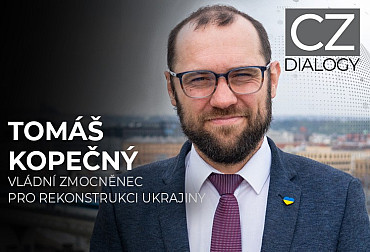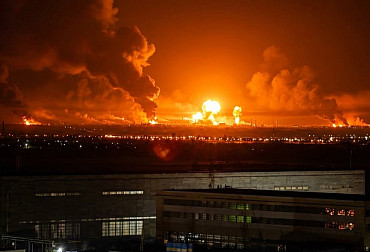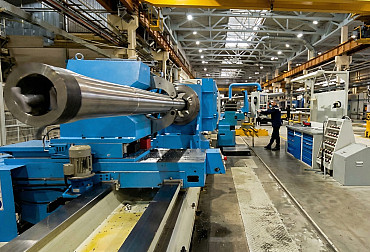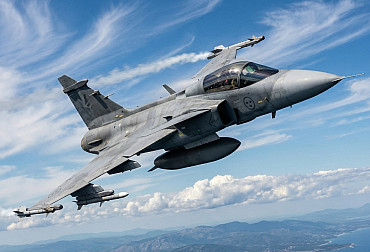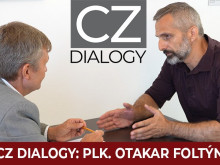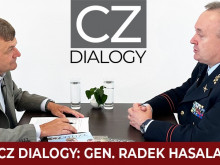Gen. Jan Štěpánek: Our goal is to effectively use all weapon systems and destroy the enemy at the longest possible distance
The 4th Rapid Deployment Brigade "Defence of the Nation", based in Žatec, is part of the Czech Army Ground Forces. The Rapid Deployment Brigade is destined to perform combat and special tasks in military and non-military threats to the Czech Republic. The brigade's tasks include participation in UN peacekeeping operations and NATO-led missions. The commander of the unit is Brigadier General Jan Štěpánek, who graduated from the Military College of Land Forces in Vyškov and started his military service as a commander of the 1st Tank Company of the 1st Tank Battalion. Gradually he commanded the 44th Light Motorized Battalion and was deputy commander of the 4th Rapid Deployment Brigade. General Štěpánek was the next guest of our CZ DIALOGY discussion programme.
Video: Interview with the commander of the 4th Rapid Deployment Brigade, Brigadier General Jan Štěpánek / CZ DEFENCE
One of the priorities of the Army is the modernisation of weapons and equipment. According to their commander, the members of the 4th Brigade have the opportunity to pass on their practical experience and suggestions within the expert teams of the Logistics Agency or the section for the development of types of forces, which prepare individual purchases. "When it comes to equipment, we are always part of the implementation teams according to the military expertise of our soldiers," explains General Štěpánek. "We are a controlled hierarchical organization. This means that we have clearly defined tasks at the tactical level. And when it comes to new weapon systems or weaponry, we work with what we have and our goal is to be able to use all weapon systems skillfully and efficiently and to destroy the enemy at the longest distance, taking care to stay on the battlefield as long as possible and to be constantly effective. Of course, this also involves repair and the ability of the crews to cope when we don't just have some cookie cutter situations. The more trained the soldiers are, the more flexible they are, they are able to react to situations they have not faced before," explains General Štěpánek.
The experience of the crews in the operation of the equipment (e.g. Pandur II 8x8 infantry fighting vehicles) is then taken into account in the planned upgrades of the equipment, which Gen. "Our experience is taken into account, which of course I welcome."
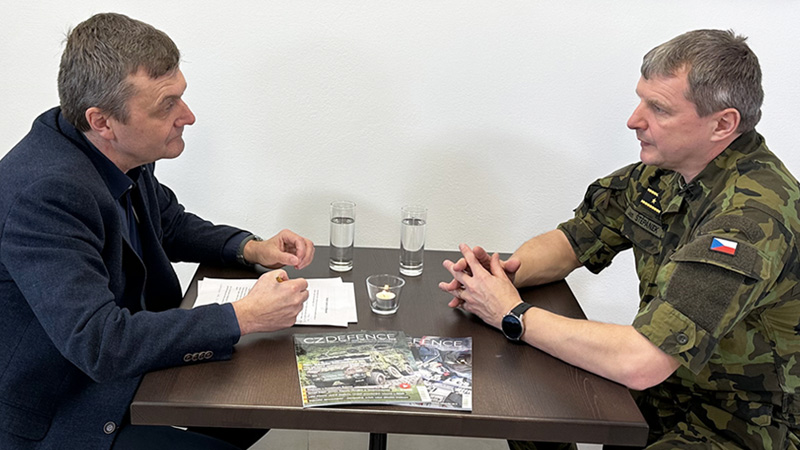 Picture: In this episode of our discussion show CZ DIALOGY, we talked to the commander of the 4th Rapid Deployment Brigade, Brigadier General Jan Štěpánek | Michal Pivoňka / CZ DEFENCE
Picture: In this episode of our discussion show CZ DIALOGY, we talked to the commander of the 4th Rapid Deployment Brigade, Brigadier General Jan Štěpánek | Michal Pivoňka / CZ DEFENCE
As far as the overall modernisation of the Czech Armed Forces is concerned, according to General Štěpánek, it is not a secret and it has been seen in recent years that new equipment and gear first went to the Fourth Brigade, which had its reasons. "We are glad for this, we did not have or do not have anything to complain about and we absolutely respect the fact that there is a necessary need to actually build a heavy brigade within the Army of the Ground Forces. It's not just IFVs, it's also tanks and other assets. And that's why it's very clear to us that we're going to have to wait a while in the near future," muses the general, who says the key is to continue training with the equipment and weapon systems that are available.
And where does the 4th Brigade stand in terms of staffing? General Štěpánek makes it clear: "It's no secret that we are short several hundred soldiers, but it's not just the 4th Brigade. The whole Army is facing a staff shortage. And as for ambition, ambition is one thing and reality is another. There are fixed recruitment numbers, but on the other hand, there is of course a limitation in terms of recruiting new soldiers because they have to go through basic training." Gen. Štěpánek also points to the capacity of the Vyškov training facility, which cannot accommodate hundreds of people at a time. "However, we have planned how many soldiers are to join the units and on what dates. Everyone is doing their best to ensure that potential candidates are properly approached in the first place. At the same time, it is necessary to work with them so that their motivation is not lost in the first instance," says Štěpánek, who believes that recruitment and training must be more adapted to society and people. This includes, for example, reducing requirements and demands. "We have to put the demands of physical or mental endurance on recruits gradually. We have had to change the philosophy and preparations of progressive training," the general adds.
The Active Reserves are also important, and the war in Ukraine can serve as an example: 'If the Army defends itself, it simply cannot. What fascinates me is that the whole of Ukraine, the whole of society, no matter who is who, has taken up the defence of their country," says Štěpánek. In his opinion, it is very important for the Active Reserves to be part of the professional Army. And joint training with professional soldiers is also important, with Gen. Štěpánek adds: "I will use the term healthy rivalry. We try not to make differences, because we have good professional soldiers, and we have good Active Reserve soldiers." "When a professional soldier leaves for the Reserves for whatever reason, before they leave the barracks, the commanders are obliged to offer them a continuation in the Active Reserve. As a rule, they welcome and accept it," the general says.
General Štěpánek also considers it important to develop other forms of national defence projects, such as POKOS (Preparation of Citizens for National Defence). "We reach out to various organisations and schools, but I think it is still not enough, that the pressure or offer, advertising, information, education should not come only from the Army. I think this is a society-wide important thing and it is time for the government to take some measures on this, where these measures will prepare the whole society in a more organized and targeted way."
Soldiers from the 4th Rapid Deployment Brigade also hold a unique shooting competition – the St. Wenceslas Cup. The origin of this competition dates back to 2014, when its first year was held at the garrison shooting range of PS Dražice near Tabor. At that time, a couple of instructors from the combat training group of the 42nd Mechanised Battalion were at the origin. "When we started this competition, it was actually a competition in shooting training from certain weapons within the 42nd Battalion "Svatováclavský" from Tábor, later within the brigade. Today, this competition is inter-departmental, even international, and its quality is constantly increasing. It is a commitment for us that we do not want to rest on our laurels and retreat from quality," the commander of the 4th Brigade evaluates the competition. The St. Wenceslas Cup has day and night shooting entries. All the participants will test their ability to react correctly and how they can work with, for example, night devices. Their readiness is already shown during the initial briefing before each task. This is not a mass competition, but a competition of the best.
In the interview with General Štěpánek we talked not only about the planned armament of the 44th Light Motorised Battalion with new Pandur II 8x8 vehicles, but also about the differences in the so-called triple and quadruple concept of unit composition, etc.











